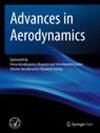Review of vortex methods for rotor aerodynamics and wake dynamics
IF 2.3
3区 工程技术
Q2 ENGINEERING, MECHANICAL
引用次数: 3
Abstract
Electric vertical take-off and landing (eVTOL) aircraft with multiple lifting rotors or prop-rotors have received significant attention in recent years due to their great potential for next-generation urban air mobility (UAM). Numerical models have been developed and validated as predictive tools to analyze rotor aerodynamics and wake dynamics. Among various numerical approaches, the vortex method is one of the most suitable because it can provide accurate solutions with an affordable computational cost and can represent vorticity fields downstream without numerical dissipation error. This paper presents a brief review of the progress of vortex methods, along with their principles, advantages, and shortcomings. Applications of the vortex methods for modeling the rotor aerodynamics and wake dynamics are also described. However, the vortex methods suffer from the problem that it cannot deal with the nonlinear aerodynamic characteristics associated with the viscous effects and the flow behaviors in the post-stall regime. To overcome the intrinsic drawbacks of the vortex methods, recent progress in a numerical method proposed by the authors is introduced, and model validation against experimental data is discussed in detail. The validation works show that nonlinear vortex lattice method (NVLM) coupled with vortex particle method (VPM) can predict the unsteady aerodynamic forces and complex evolution of the rotor wake.旋翼空气动力学和尾迹动力学中旋涡方法的综述
近年来,具有多个升力旋翼或螺旋桨旋翼的电动垂直起降(eVTOL)飞机因其在下一代城市空中机动(UAM)方面的巨大潜力而受到广泛关注。数值模型已被开发并验证为分析旋翼空气动力学和尾流动力学的预测工具。在各种数值方法中,涡旋法是最合适的一种方法,因为它可以以低廉的计算成本提供准确的解,并且可以表示下游的涡度场,没有数值耗散误差。本文简要介绍了涡旋法的研究进展,以及它们的原理、优缺点。本文还介绍了旋翼空气动力学和尾迹动力学建模中涡旋方法的应用。然而,涡旋方法存在着不能处理与粘性效应和失速后流动特性相关的非线性气动特性的问题。为了克服涡旋方法固有的缺陷,介绍了作者提出的一种数值方法的最新进展,并详细讨论了模型与实验数据的验证。验证结果表明,非线性涡点阵法(NVLM)与涡质点法(VPM)相结合可以预测旋翼尾迹的非定常气动力和复杂演化过程。
本文章由计算机程序翻译,如有差异,请以英文原文为准。
求助全文
约1分钟内获得全文
求助全文

 求助内容:
求助内容: 应助结果提醒方式:
应助结果提醒方式:


